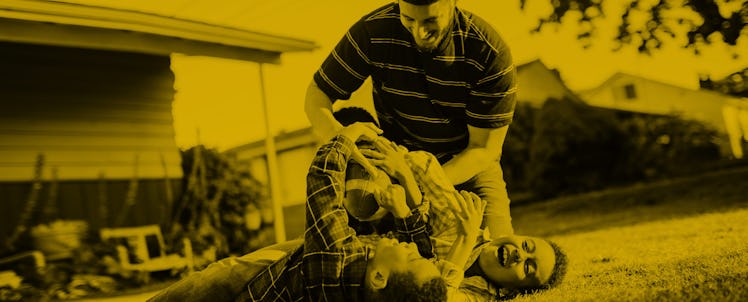Talking To Kids About Money Is Way Easier If You’re Honest
They don't need to know everything. They just need to know that you're willing to look reality in the face and do something about it.

It was a chilly November Sunday at the local high school. I was with my boys, competing. We’d had contests to see which duo could get 100 consecutive throws of a lacrosse ball without a drop, played the end-zone tackling game, kicked footballs through the uprights using my left shoe as a tee, and run sprints up and down the field. Now we were practicing routes. I was throwing the ball. They were running, but the afternoon was winding down.
“Two more completions and then let’s go get those donuts,” I shouted before tossing what looked like a dime downfield.
As my middle kid maneuvered under the pass, my two other sons balked. “But Dad,” said the eldest. “You got fired from your job.”
“Yeah,” I said. “It’s the end of the world.”
This story was submitted by a Fatherly reader. Opinions expressed in the story do not necessarily reflect the opinions of Fatherly as a publication. The fact that we’re printing the story does, however, reflect a belief that it is an interesting and worthwhile read.
The ball flew three feet too far and the kid was right. I had just been fired, becoming the casualty of an election. We were facing some real adversity — the kid didn’t even know how bad the market was for someone with my skills — and the concern was real. My sons weren’t read in on our finances, but they sensed anxiety and my flippancy wasn’t going to convince them that everything was fine.
“It’s the end of the world.” What a ridiculous, crazy laconic utterance, framed between a lost job and a bad pass. I couldn’t ignore the obvious but I was determined to set an example of calm, lower the temperature bigtime, even get a yuk out of it. Perspective, folks: Nothing is ever as bad as it seems. Everyone has tough times and there are only three choices: Lie to yourself, wallow in self-pity, or drive forward. (That third option is typically the one you want to choose.)
Acknowledging my situation with equanimity was the best way to prove a point to the boys and the light, sardonic utterance had an effect. It was good parenting by accident.
“Yeah, it’s the end of the world.” It completely deflated the drama balloon. Almost instantly, the boys began repeating the phrase about small and big problems they faced. I know for a fact that just one of the boys saying the phrase, even with casual grimness, made that kid feel stronger, more independent in confronting the challenge. No immediate running to a parent with panic; no moping about or spectacles, no days’ long despair. The old man had accepted his failure and was prepared to move forward. Through my example, however tough, my sons realized they could try to have the same resiliency.
Seven years later, we were at the same field on which I’d proved a second-rate quarterback but an honest operator. The boys were bigger, faster and stronger and I was employed (things had ultimately worked out alright).
We were horsing around, doing sprints from goal line to goal line. I couldn’t hold my own anymore. Afterwards, we were lying on the turf, the four of us staring at a clear afternoon sky. “Almost donut time,” said the middle kid. Then the eldest asked if I remembered when we’d come to the same field after I got fired. “Like yesterday,” I told him. Then the youngest pointed out that back then I could outrun him.
“Yeah,” I replied. “It’s the end of the world.”
Jeff Nelligan is the father of three sons; the two eldest are graduates of the U.S. Naval Academy and Williams College, the third is at West Point. He is the author of Four Lessons From My Three Sons: How You Can Raise a Resilient Kid.
This article was originally published on